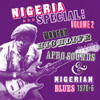 This is purportedly the final album in Soundway’s excellent Nigeria Special series (a fact that causes me no small amount of pain), but at least it is concluding in fine form. While some of the previous albums may have hit higher highs, the breezy, laid-back songs collected here might be the most consistently strong and listenable batch yet (though without entirely forgoing eccentricity). This will likely be the soundtrack for my summer.
This is purportedly the final album in Soundway’s excellent Nigeria Special series (a fact that causes me no small amount of pain), but at least it is concluding in fine form. While some of the previous albums may have hit higher highs, the breezy, laid-back songs collected here might be the most consistently strong and listenable batch yet (though without entirely forgoing eccentricity). This will likely be the soundtrack for my summer.
It is difficult to believe that most of the tracks compiled here have been out of print for over three decades, as this album is packed with memorable melodies and lazily infectious grooves from the very beginning. The ridiculously titled “Psychedelic Baby” kicks the album off perfectly with a languorous rhythm, sultry horns, and a pleasingly bittersweet chorus, setting a standard of excellence that does not waver until the album ends. Notably, "Psychedelic Baby" features one of my favorite soul music tropes: a spoken word monologue/confessional addressing a possibly fictitious woman (a move that only becomes more charming with the addition of heavily-accented, difficult-to-understand English). Sadly, none of the other 18 artists included here takes some time to break it down for the ladies, but they manage to hold my attention pretty well anyway. On a related note, I am also a huge fan of absurdly grandiose and unwieldy band names, an appetite that this album satisfies admirably (“Commander In Chief Stephen Osita Osadebe & His Nigerian Sound Makers” being my favorite, despite stiff competition).
There is no noticeably weak or even average material here, but there are a number of stellar tracks strewn throughout the album that stand out from the rest. Two of the best are by so-called “progressive” bands: Tunji Oyelana & The Benders and The Nkengas. In this case, however, that term has no relation to its oft-unfortunate Western connotations- instead, both bands are merely more ingenious and resourceful than their peers. Oyelana’s “Iwo Ko La Dami” features jazzy sax leads and a minimalist guitar vamp that are similar to many of the other acts from that era, but bolsters them with incredibly tight, funky, and virtuousic drumming. As for The Nkengas, their “Anyi Bundi Igbo” boasts a brilliantly space-riddled and compartmentalized production that sounds like it was filtered through Martin Hannett.
Curator Miles Claret seems to have deliberately opted for more uniformly relaxed and spacious feel with this album, eschewing the more aggressively funk-influenced and heavy-handed strains of ‘70s Nigerian music for a strong emphasis on Highlife. Nevertheless, he still snuck in some moments of oddball experimentalism. For example, “Totobiroko” is based on a hypnotically repeating bass pattern and a weirdly erratic xylophone motif, but manages to maintain an extremely cool tribal groove in the process. The album’s closer (by Joy Nwoso and Dan Satch) is still stranger, as it uses an endlessly repeating two-note bass line and languid brass hook to hold together a lurching beat and bizarrely operatic female vocals. Both tracks are certainly disorienting and outré when heard alone, but they are sequenced in such a way as to fit quite seamlessly with the less boldly ambitious surrounding material. Also, a great beat goes a long way towards making indulgent weirdness palatable.
Nigeria Special Volume 2 is an excellent place to start for anyone curious about African music. While the ‘70s birthed a lot of brilliant and vital music in countries like Nigeria, Benin, Ghana, Senegal, and Lagos, that era was also characterized by rampant clutter, over-enthusiasm, structurelessness, and bloated song-lengths. Claret is much better at sifting through it all than most, resulting in an album packed with short, hook-filled songs and killer rhythms, but without sacrificing rawness or immediacy. This is, simply put, great music. I am sad to see this series end (especially so soon after the Panama! swansong), but I am sure Miles and Soundway have something equally compelling looming on the horizon.
(The triple LP version of this album features three extra songs not covered here)
Samples:
- The Nkengas - Anyi Bundi Igbo
- Fubura Sekibo - Psychedelic Baby
- Commander In Chief Stephen Osita Osadebe & His Nigerian Sound Makers - Onyebu Chi
Read More

